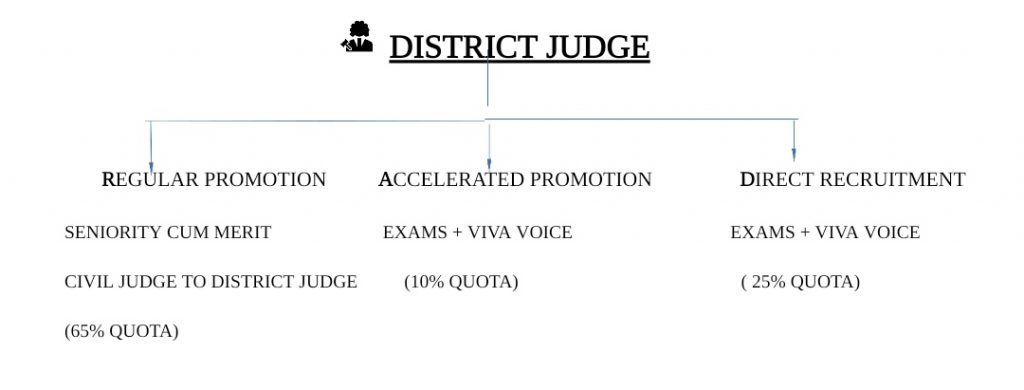This Article is written by Srija Singh, student of Amity law school, Noida and the article has been edited by Khushi Sharma (Trainee Associate, Blog iPleaders).
Table of Contents
Introduction
One should take knowledge without losing a single moment and save every particle and collect money. The one who lost moment does not get knowledge and those who consider particles as small do not get money.
One of the all-important three pillars of Indian democracy. The legislature and executive are the other two and in multi-party democracy like India. Judiciary is considered one of the most important pillars, as it is a one-off that, has to strengthen the other pillars that too without crossing its own limits so it is of utmost importance that guardian of the judiciary should be of high calibre, extremely knowledgeable, and must be best for the legal community to select some of best among the best there is a selection process.
Judicial service examination or judiciary service examination or judiciary exam also referred to state civil services exams or PCSJ provincial civil service judicial examination where fresh graduates get selected. It is conducted by the public service commission of each state.
State government take these exams under the supervision of respective high courts to appointments of the lower judiciary as per requirement.
The judicial officer starts their career as judicial magistrate 2nd class officer in the cadre of civil judge (junior division) however, in India JM 2nd class post is considered as probation or training post after completing the training period. They are posted as judicial magistrates (1st class category). It basically requires 7 years of practice in the bar for the higher judiciary exam however for the lower judiciary one can give an exam just after under graduation course.
Eligibility criteria
Lower judiciary (Civil Judge)
- LLB degree (5 or 3 years) recognized by BARC (BAR COUNCIL OF INDIA)
- Minimum age requirement- above the age of 21 and below the age of 35 years.
(Age limit varies from state to state)
- Age relaxation for ST/SC/OBC/PWD)
- He/she must be an Indian citizen
Higher judiciary
- A candidate must be an advocate not less than 7 years of continuous practice
- Age limit 35 years minimum and 45 years maximum (varies state to state)
- 3 years of relaxation for SC/ST and OBC candidates.
Syllabus
- GK and current affairs
- Proficiency in English language and aptitude
- Constitutional law
- IPC, CRPC, CPC, THE INDIAN EVIDENCE ACT
- Contract law and Tort law
- Transfer of property tax
- Local laws like renter laws etc.
Most judges of high court and supreme court have become by elevation. There is fixed quota for them. They are appointed directly.
Why start early?
Starting early will give you a maximum window to prepare. It also enables you to create a backup option. Here early means after 1.5 years of 5 years LLB program and 1st semester of 3-year LLB program. So that you’re settled into law. You should have basic terminology which takes time to acknowledge and also because 5 years is a long period. Very few people approach their jobs which they have thought of in 1st year. Also, because it will saturate your mind and eventually by the time you will get tired.
How to initiate?
- First focus on lectures given by college professors to make your foundation strong
- Start reading a newspaper. It will not only keep you updated but also increase your horizon, vocabulary, command of the language.
- Start reading bare acts
- Get into the habit of reading case laws especially (Ratios)
- Start reading NCERT books of class 8th to 12th (history, geography, political science, economics). Also, read science books from class 8 to 10th.
- Assemble all state previous year question paper to get in shape. it will help you in screening
Do we need a backup?
Yes, this is a competitive exam more than 50 thousand people sit for the exam depends on state to state. Only 100 seats are there for the general category despite your best preparation there is no guarantee that you will crack the exam even if you give twice or thrice so we require some kind of backups also to decrease peer pressure.
- One can go for litigation because of subjects you will be studying.
- Explore working in dispute resolution of a law firm it will require some skill as litigation especially focusing on white-collar crimes, arbitration etc.
- Working in a law firm as an in-house counsel.
- It is a different direction but if you follow a structured learning path you can acquire such skills in one to 2 years spending 1-1.5 hours.
- You can give LLM entrance exam while preparing for the exam as it requires understanding the core of law subject.
How to manage academics whule oreparing for the judiciary?
- One can focus on topics that are important for exam
- One solution to every problem is time management.
- Don’t prepare for more than 2 or 3 states at a time. otherwise, it will be a waste of effort
- Try making notes in the class itself. It should not be a direct copy but derivatives of the conclusion
- Develop the habit of writing a research paper.
Can we skip internships?
No, firstly because it will help you acquire practical skills. Secondly, it will not only work as a backup option but also increase your chances of cracking interviews as there are higher chances that a person with practical experience will answer better and to the point in the interview.
Also, you should not do internships just for the sake of certificates. For example- I have just started interning at NGO so I asked sir to give me the work which will help in the long run so he asked me to write an article on this particular topic. Since I’ve joined law school a few weeks ago I didn’t have much idea about judicial exams. So this opportunity not only help me to get a certificate but also act as a boon to give me directions in my very initial years of preparation.
Suggestions
Try to learn your best no matter how big or small the internship is. Because skill is the only thing that will create a difference in later stages of life.
Conclusion
Before writing this manuscript, I’ve watched numerous videos related to judiciary preparation and talked to several seniors who made it without tutoring. So, the only thing which I found was common between them was consistency and self-confidence. There’s a well-known saying “Rome was not inbuilt a day”. You have to work daily for achieving your target and planning is considerably important to maximize your best result. Last but not least if you’ll fall in love with the process. The result will come.
Students of Lawsikho courses regularly produce writing assignments and work on practical exercises as a part of their coursework and develop themselves in real-life practical skills.
LawSikho has created a telegram group for exchanging legal knowledge, referrals, and various opportunities. You can click on this link and join:
https://t.me/joinchat/L9vr7LmS9pJjYTQ9
Follow us on Instagram and subscribe to our YouTube channel for more amazing legal content.
 Serato DJ Crack 2025Serato DJ PRO Crack
Serato DJ Crack 2025Serato DJ PRO Crack












 Allow notifications
Allow notifications


